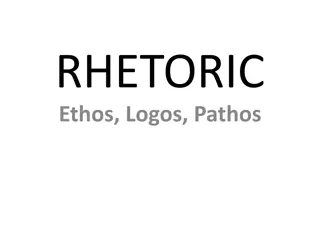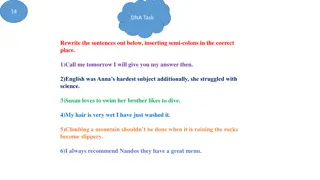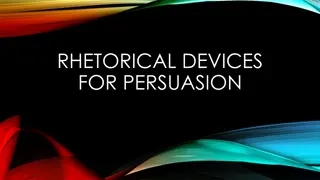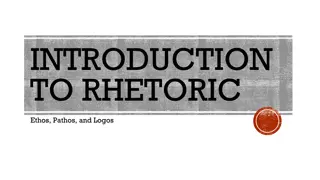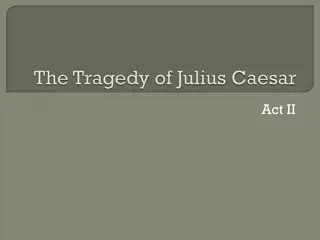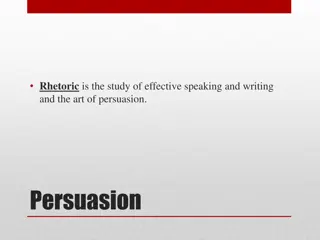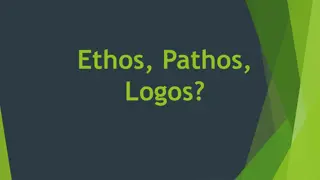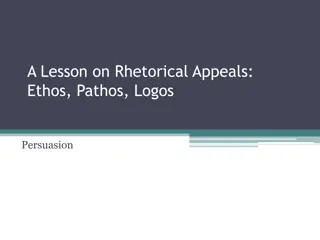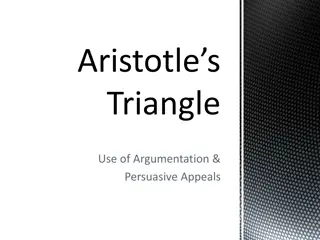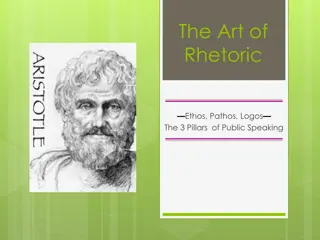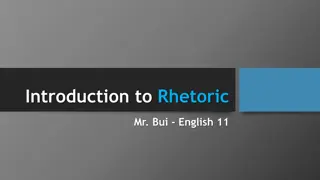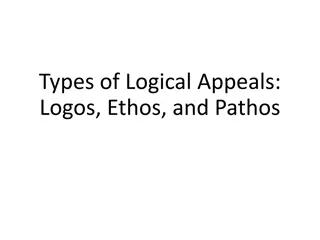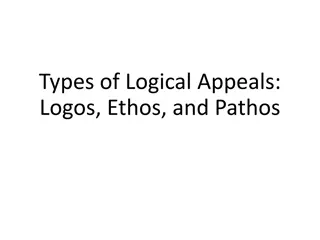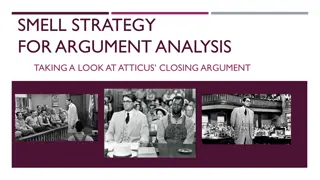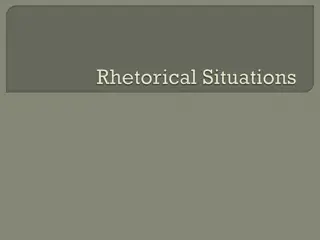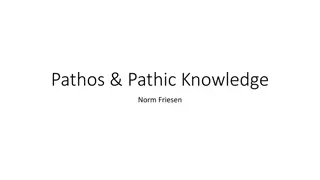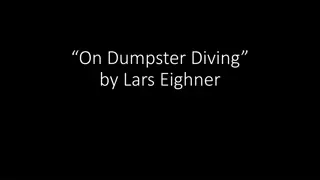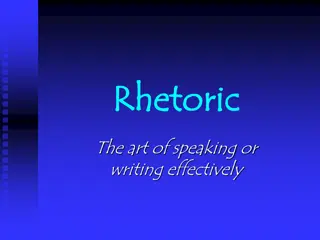Understanding Rhetoric: Ethos, Logos, Pathos in Persuasion
Rhetoric explores the art of persuasive communication, emphasizing three key components: Ethos (credibility), Logos (logic/facts), and Pathos (emotion). Understanding the three types of rhetoric and persuasive appeals can enhance one's ability to craft compelling arguments. Through examples, student
0 views • 10 slides
Understanding the Differences Between Broadsheets and Tabloids
Explore how meaning is conveyed differently in broadsheets and tabloids by analyzing layout, form, and presentation. Consider the target audiences and key themes such as the appeal to pathos. Develop an understanding of persuasive appeals and compare examples of both types of newspapers. Gain insigh
0 views • 20 slides
Mastering Rhetorical Devices for Persuasion
Understand the art of rhetoric and the power of persuasion through ethos, pathos, and logos. Explore how writers use varying techniques like formal word choice, emotional appeal, and allusion to sway audiences. Delve into the persuasive appeals of ethos, pathos, and logos as explained by Greek philo
0 views • 12 slides
The Art of Rhetoric and Persuasion: A Journey from Greece
The history of rhetoric and the concepts of persuasion trace back to ancient Greece with prominent figures like Aristotle and Plato. Aristotle's book, "The Art of Rhetoric," introduced the three methods of persuasion - Pathos, Logos, and Ethos. Pathos appeals to emotions, Logos involves logic and re
0 views • 25 slides
Understanding Rhetoric: Ethos, Pathos, Logos
Rhetoric is the art of persuasive communication in various contexts. It involves utilizing ethos (credibility), pathos (emotions), and logos (logic) to influence the audience. Distinguishing between argument and persuasion, this communication form employs elements such as organization patterns, appe
4 views • 18 slides
Understanding Rhetoric and Characterization in Shakespearean Works
Delve into the realm of rhetoric, exploring the concepts of logos, pathos, and ethos alongside the art of persuasion through language. Uncover the nuances of blank verse in Shakespearean poetry and the significance of characterization in revealing the depths of characters in his plays.
7 views • 32 slides
Understanding Fallacies in Argumentative Techniques
Dive into the world of fallacies in argumentation, exploring the nuances of Ethos, Pathos, Logos, and various rhetorical devices. Uncover the pitfalls of faulty Ethos and Pathos, dissecting examples such as Poisoning the Well and Appeal to Pity. Enhance your critical thinking skills by recognizing a
0 views • 16 slides
Strategies for Answering Opposition in Argumentation
Utilize various strategies to effectively counter opposing viewpoints in arguments, including analogy, classification, comparison/contrast, definition, description, example, humor, narration, problem/solution, and reiteration. Analyze model arguments by summarizing claims, evaluating supporting poin
0 views • 15 slides
Understanding Rhetoric and Persuasion Techniques
Rhetoric is the art of effective speaking and writing, encompassing persuasion techniques like PATTR analysis, Aristotelian appeals (Pathos, Logos, Ethos), and understanding speaker-audience dynamics. Logos appeals to logic, Ethos to ethics, and Pathos to emotions, with an important focus on audienc
0 views • 18 slides
Historic Speech Excerpts Reflecting Rhetorical Techniques
Excerpts from speeches by Martin Luther King Jr., Barack Obama, and Ben Bernanke showcase the use of ethos, pathos, and logos in persuasive communication. Each speaker employs different rhetorical strategies to convey their messages effectively. King's emotive appeal, Obama's strategy of outlining s
0 views • 13 slides
Understanding Pathos in Argumentation: An Ethical Perspective
Pathos, as highlighted by Aristotle, plays a crucial role in argumentation by appealing to the emotions of the audience. While traditional views might view emotion as secondary to reason, a deeper insight reveals that emotion-based elements are essential for crafting powerful and ethically sound arg
0 views • 30 slides
Understanding Rhetorical Appeals: Ethos, Pathos, Logos
Delve into the art of persuasive communication through the exploration of ethos, pathos, and logos appeals. Discover how these rhetorical tools are utilized to sway audiences' emotions, logic, and credibility. Gain insights on how to analyze and decipher persuasive techniques employed by writers, sp
0 views • 26 slides
Understanding Aristotle's Communication Triangle: Logos, Pathos, Ethos
Explore Aristotle's Triangle of Argumentation and Persuasive Appeals, analyzing the role of logos, pathos, and ethos in effective communication. Discover how each element influences communication strategies, from rational reasoning and emotional appeals to ethical credibility.
0 views • 10 slides
Unveiling the Art of Rhetoric: Ethos, Pathos, Logos - Aristotle's Three Pillars of Persuasion
Aristotle's timeless principles of Ethos, Pathos, and Logos serve as the foundation for effective public speaking. Ethos focuses on credibility and character, Pathos on emotional appeal, and Logos on logical reasoning. Mastering these pillars can enhance a speaker's persuasiveness and connection wit
0 views • 49 slides
Unveiling the Art of Rhetoric: A Comprehensive Guide for English 11 Students
Delve into the world of rhetoric with Mr. Bui as your guide in English 11. Explore the definition, background, and significance of rhetoric, along with key concepts such as SOAPStone, the Rhetorical Triangle, and the Rhetorical Appeals (Ethos, Logos, Pathos). Learn how Aristotle laid the foundation
0 views • 24 slides
Understanding the Three Types of Logical Appeals: Logos, Ethos, and Pathos
Explore the different types of logical appeals used in writing - Logos (appeals to reason), Ethos (appeals to values), and Pathos (appeals to emotions). Learn how to balance these appeals to create a persuasive argument and avoid overreliance on emotional manipulation.
0 views • 7 slides
Understanding Different Types of Logical Appeals: Logos, Ethos, and Pathos
Explore the realms of logical appeals - Logos, Ethos, and Pathos. Learn how to balance facts, values, and emotions in your writing to create compelling arguments. Uncover the significance of appealing to reason, ethics, and emotions in persuasive communication.
0 views • 9 slides
Unveiling Persuasive Strategies in Atticus' Closing Argument
Explore the comprehensive analysis of persuasive strategies employed by Atticus in his closing argument, including ethos, pathos, logos, and linguistic devices. Delve into the intricacies of sender-receiver relationship, message content, emotional appeals, logical reasoning, and language choices.
0 views • 6 slides
Effective Argument Analysis Strategies and Writing Techniques
Explore the key qualities of effective arguments, from sophistication of thought to coherence, and learn strategies to analyze rhetorical situations. Discover various forms of writing, including memoirs, essays, and speeches. Dive into the world of figurative language and word choice, understanding
0 views • 16 slides
Understanding Rhetoric: Aristotle's Three Means of Persuasion
Rhetoric, as Aristotle defined it, is the art of persuasion through available means. This involves utilizing logos (logic), pathos (emotions), and ethos (trustworthiness) to influence an audience. Writing serves various purposes like self-exploration, communication, entertainment, record-keeping, or
0 views • 16 slides
Understanding Pathos and Pathic Knowledge in Philosophy: Insights from Norm Friesen and Waldenfels
Explore the concepts of pathos and pathic knowledge as discussed by philosophers such as Norm Friesen and B. Waldenfels. Pathos, originating from Greek, refers to the quality that evokes pity or sorrow. Waldenfels delves deeper into the notion of pathos, linking it to experiences that provoke senses
0 views • 19 slides
Analyzing "On Dumpster Diving" by Lars Eighner
This analysis explores the rhetorical strategies, language usage, and irony in Lars Eighner's essay "On Dumpster Diving," focusing on allusions to Kerouac and Steinbeck, the appeal to ethos, logos, and pathos, and the distinction between scavengers and scroungers. It delves into the effects of scien
0 views • 6 slides
Effective Persuasion Strategies: Logos, Pathos, and Ethos
Learn about three powerful ways to strengthen your arguments and make them more convincing: logical appeals (logos), emotional appeals (pathos), and ethical appeals (ethos). Discover how to use facts, statistics, expert opinions, loaded language, sensory details, and author credibility to appeal to
0 views • 9 slides
Mastering the Art of Rhetoric: Ethos, Logos, and Pathos
Delve into the world of rhetoric with a focus on ethos, logos, and pathos. Explore the significance of ethos in establishing credibility, logos in using logic and evidence, and pathos in appealing to emotions. Uncover how these elements play a crucial role in effective communication and persuasion a
0 views • 20 slides
Analyzing JFK's Rhetorical Devices in Inaugural Address
Explore the rhetorical devices used by JFK in his Inaugural Address through a formal academic lens. Understand the purpose, audience, claims, and counterclaims presented in the speech. Discover the impact of rhetorical devices like ethos, pathos, logos, and more on the overall message conveyed by JF
0 views • 13 slides
Mastering Rhetorical Analysis in Academic Writing
Dive into the essentials of analyzing and evaluating authors' arguments, claims, and rhetorical strategies in academic texts. Uncover how ethos, pathos, and logos contribute to persuasion and explore effective writing techniques and strategies. Enhance your understanding of constructing introduction
0 views • 37 slides
Analyzing Rhetorical Devices in King and Wiesel Speeches
Explore the rhetorical devices used by Martin Luther King Jr. and Elie Wiesel in their speeches through the lens of ethos, pathos, logos, repetition, parallelism, metaphor, allusion, imagery, diction, and rhetorical questions. Understand how these devices strengthen the authors' positions and argume
0 views • 10 slides
